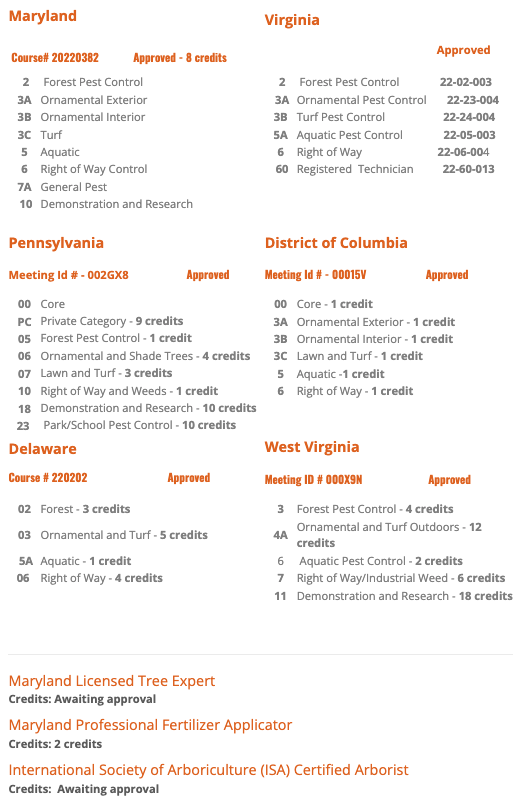2022 LCA Pesticide and Fertilizer Recertification Conference
Registration is now closed.
Registration Fees
Register by January 15, 2022, for early-bird savings!
Member: Early-Bird – $95 | Regular – $135
Nonmember: Early-Bird –$145 | Regular – $185
If you intend to register more than three individuals from your company, please contact Julianne Clarke - [email protected] (301) 948-0810 for assistance.
Conference Sessions - Register by February 25, 2022
Credit information coming soon.
Aquatics—Plant Management
Raymond Bosmans, University of Maryland Professor Emeritus
Managing aquatic weeds can be much easier with a better knowledge of aquatic plants and a better understanding about how a pond “works”. In this presentation you will learn about the various interesting species of emergent, submerged, and floating plants, as well as information about the two forms of algae common in most ponds. Pond biology, which has a direct effect on plant growth, will be included along with various techniques of pest plant management.
Blasted Insects for 2022
Stanton Gill, University of Maryland Extension
See what our field research has come up with dealing with established pests and new invasive pests in the landscape. We will discuss the aftereffects of the periodical cicada and the damage it caused. New emerging pests such as box tree moth will be discussed and the best way to deal with it.
Leaf Feeding Insects in Turf and the Magic Bullet
Richard J. Buckley, Rutgers University
Leaf feeding insects in turfgrass are often overlooked threats or treated indiscriminately with broad-spectrum insecticides. This one hour lecture covers three of the most common turf insect pests found in the mid-Atlantic region in the context of an Integrated Pest Management program. The biology and behavior of each insect will be profiled as well as insect identification tips, damage assessments, scouting tools and techniques, and management practices to include all chemical, biological, and cultural controls.
Forest Health Update
Lori Chamberlin, Virginia Department of Forestry
This session will cover significant forest health threats to our trees and forests including invasive insects and tree diseases. We'll discuss the damage they cause, their distribution, and up-to-date management strategies including cultural, chemical, and biological control. Learn about emerging pests and how we can prevent them from becoming established in our forests.
The Importance of Soil Health, the Benefits of Soil Amending
Ron Alexander, R. Alexander Associates, Inc.
Improving soils before planting has been a practice of many landscapers and turf managers for decades. But today, the creation of more climate resilient soils (healthy soils) is really a requirement for success. The creation of these soils can save fertilizer, irrigation, and even pesticide costs. The economics and benefits of this practice will be discussed as will products available in the Mid-Atlantic States.
Landscape Diseases - A 2021 Recap
Dave Clement, University of Maryland Extension
Spots, blights, wilts, and root rots–trees and shrubs suffered from several diseases in 2021. Learn how to recognize and deal with these common and not-so-common diseases and what to expect in 2022.
Right of Way Weed Control
Chuck Schuster, University of Maryland Extension
Right of way weed control plays an important part in safety. What methods can be used and how can one avoid the potential of runoff or drift? A review of products, equipment, and techniques as well as the proper timing to get the best weed control in the setting you are responsible for.
Turf Weed Control
Chuck Schuster, University of Maryland Extension
What is happening with our weed control in turfgrass? Recent winters have moved into spring earlier each year. Dealing with weeds needs to be an ongoing process. Trying something new may be of assistance to stay ahead of the troublesome weeds one deals with each year. A review of some new technologies that are available for weed control as well as some methods of cultural control methods to keep the weeds under control in turfgrass.
Beech Leaf Disease and Other Recent Plagues
Margery Daughtery, Cornell University Extension
This session will cover the diseases that were notable in 2021 as well as the integrated management of these problems. Learn the symptoms and the environmental conditions behind spring leaf diseases such as Anthracnoses, needle casts and rusts. Midsummer problems this year included Cristulariella leaf spot on maple and black leaf spot on elm, plus powdery mildew on nine bark and Japanese maple. All season long the new Beech Leaf Disease - caused by a nematode! - caused concern for lovers of American and European beech trees. Fall brought boxwood blight and the second part of the pear trellis rust life cycle. Learn about the latest research on some of these diseases, and about the cultural and chemical management for many of the problems we saw this year.
Update on Fertlizer Applicator Requirements for MD
Judy McGowan, Maryland Department of Agriculture, Nutrient Management Program
Update on Fertlizer Applicator Requirements and General Updates from DC
Alvin Harris, District Dept. of Environment Hazardous Materials Branch, Pesticide Program
Update on Fertlizer Applicator Requirements and General Updates from VA
Power Point provided.
For the latest updates go to this link: www.lcamddcva.org/page/pestcategories22

Price
Register by February 25, 2022
All sessions must be completed by 11:59pm, February 28, 2022 to earn credits offered.
Cancellation Policy
Written cancellations received prior to January 31, 2022, are subject to a 15% cancellation charge. Substitutions will be accepted. No refunds will be given after January 31, 2022.

 Facebook
Facebook X
X LinkedIn
LinkedIn Forward
Forward